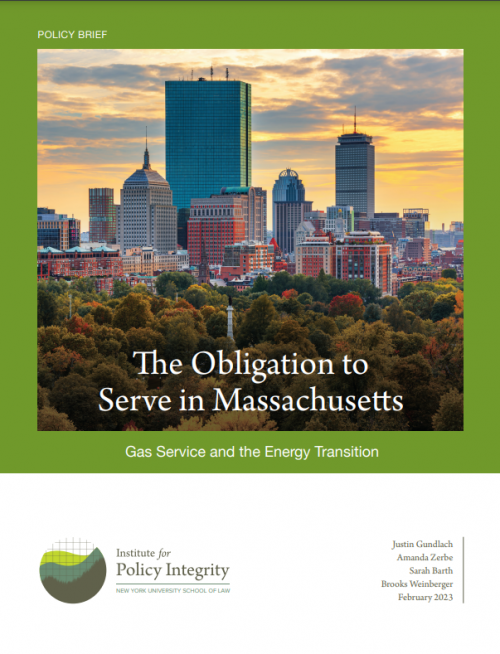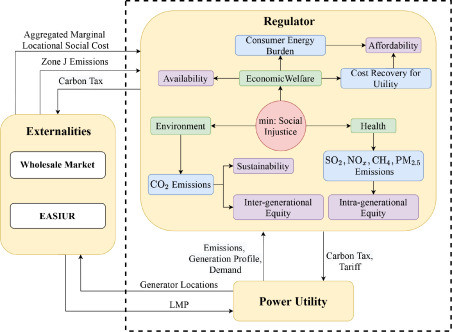-
Comments on EPA Draft Update to Social Cost of Greenhouse Gas Metrics
Together with a coalition of environmental groups, we submitted comments to EPA on its draft update to the social cost of greenhouse gas estimates of climate damage. We commended the agency's extraordinary advances and recommended ways to further improve the accuracy of the metrics.
-
Comments on EPA’s Supplemental Proposal on Oil and Gas Sector Methane Standards
In December 2022, EPA issued a Supplemental Proposal to update, strengthen, and expand its proposed standards to regulate methane emissions from new and existing sources in the oil and natural gas sector. We submitted comments on EPA’s Supplemental Proposal and underlying Regulatory Impact Analysis (RIA) recommending that EPA strengthen its RIA to more fully capture the impacts of these standards by: (1) extending the timeframe of its analysis to quantify net benefits past 2035, (2) monetizing ozone health benefits related to methane emissions reductions, (3) better monetizing and quantifying co-benefits, and (4) better quantifying the impacts of the super-emitter response program or using a breakeven analysis if further quantification is not possible. We further recommended that EPA expand its distributional analysis of the impacts of the rule.
-

The Obligation to Serve in Massachusetts
Gas Service and the Energy Transition
In Massachusetts, achieving the state’s decarbonization target in a cost-effective manner will likely require the refusal of new gas service in addition to the termination of existing gas service in certain buildings and its replacement with electric service. The scope of utilities’ legal obligation to serve their customers will be central to those efforts. This brief analyzes the contours of this obligation by examining the relevant Massachusetts statutes, regulations, Public Utility Commission decisions, and case law.
-
Comments to FTC on Unfair or Deceptive Fees Trade Regulation
On October 20 2022, the FTC voted to grant the Institute for Policy Integrity’s petition for rulemaking and issue an Advanced Notice of Proposed Rulemaking on Unfair or Deceptive Fees Trade Regulation Rule. Commissioner Christine S. Wilson issued a dissenting statement in which she raised major questions doctrine concerns and asked for precedent that supports FTC's authority to promulgate this rule. We submitted a letter responding to Commissioner Wilson’s concern and providing regulatory antecedents supporting the FTC’s authority. In this letter, Policy Integrity shows that FTC's rule would not be unheralded nor represent a transformative change in the agency's authority, and therefore, it would not implicate the major questions doctrine.
-
Comments to DOE on Energy Conservation Standards for Circulator Pumps
Together with partner groups, we submitted joint comments to the Department of Energy (DOE) on its proposed rule to strengthen energy conservation standards for circulator pumps. Our comments applaud the agency for appropriately applying the social cost of greenhouse gases to estimate the climate benefits of the proposed standards. We also suggest that DOE apply additional analysis using draft updated climate-damage valuations that the Environmental Protection Agency recently released.
-
Policy Integrity Amicus Brief Cited Extensively in BLM Drilling Case
We filed an amicus brief in a case challenging the Bureau of Land Management's approval of over 300 oil and gas drilling permits in New Mexico. Our brief highlighted problems in the agency's analysis, which inappropriately minimized the climate impacts of new drilling through comparison to nationwide totals. We explained that the agency’s approach did not facilitate a rational analysis of the project's climate effects and failed to meet the National Environmental Policy Act’s requirement that agencies analyze the actual environmental impacts of their actions. In its decision ruling against the agency, the U.S. Court of Appeals for the Tenth Circuit cited our brief extensively and adopted many of our arguments against BLM’s comparison-based approach to assessing the significance of climate impacts.
-
Comment Letter on BLM Waste Prevention Rule
In November, the Bureau of Land Management proposed a regulation to reduce the waste of natural gas on federal lands through venting, flaring, and leakage. In our comment letter, we recommend avenues for BLM to bolster its legal and economic support for the proposal. In particular, we recommend that BLM more expressly disavow its prior position that waste-prevention regulations must benefit regulated industry, more closely evaluate the proposal’s effects to ensure that its analysis fully captures resulting benefits and royalty revenues, and recognize the significance of the rule’s climate benefits.
-
Comments to SEC on Major Questions Doctrine
In June 2022, the Institute for Policy Integrity jointly submitted three comments to the Securities and Exchange Commission regarding its Proposed Rule on the Enhancement and Standardization of Climate-Related Disclosures for Investors. One of those comments highlighted regulatory precedents reaching back nearly sixty years that support the SEC's approach in the Proposed Rule. On January 30, 2023, we submitted as supplemental comments a recent article from Natasha Brunstein and Donald L. R. Goodson, Unheralded and Transformative: The Test for Major Questions After West Virginia, forthcoming in the William and Mary Environmental Law and Policy Review, which analyzes the Supreme Court’s decision in West Virginia v. EPA, 142 S. Ct. 2587 (2022). This new article bolsters the relevance of the regulatory precedents cited in Policy Integrity's previous joint comments as support for the Proposed Rule.
-

Electricity Tariff Design via Lens of Energy Justice
Distributed Energy Resources (DERs) can significantly affect the net social benefit in power systems, raising concerns pertaining to distributional justice and equity. Current tariff design approaches suffer from opaque efficiency-equity trade-offs and are also agnostic of the externalities that affect both economic efficiency and equity. Therefore, this paper develops a justice-cognizant tariff design framework that improves the operational savings in the system without sacrificing distributional equity, and encompasses economic welfare, social costs of environmental and public health impacts, and socio-economic and demographic characteristics of electricity consumers. We evaluate four different tariff structures using a Multi-Objective Problem with Equilibrium Constraints. We then compare the operational savings and equity of the proposed framework using the 11-zone New York ISO and 7-bus Manhattan power networks. The results demonstrate that justice-cognizant, and spatially- and temporally-granular tariffs ensure equity and increase the operational savings at a lower energy burden to consumers.
-
Comments on NRCS Agriculture Funding Strategy
Policy Integrity submitted comments to the U.S. Department of Agriculture's Natural Resources Conservation Service (NRCS) in response to its Request for Information about how it can most effectively distribute its share of Inflation Reduction Act funding. This $19 billion in funding, which is allocated across NRCS's core conservation programs, must be given out to support agricultural practices that reduce or sequester greenhouse gas emissions. Our comments encourage NRCS to award the funding to practices that will maximize net social benefits and to increase the transparency of its project-ranking process. We urge NRCS to consider a range of factors in its analysis, including a practice's potential to reduce greenhouse gas emissions, produce knowledge, and offer ecosystem services.






